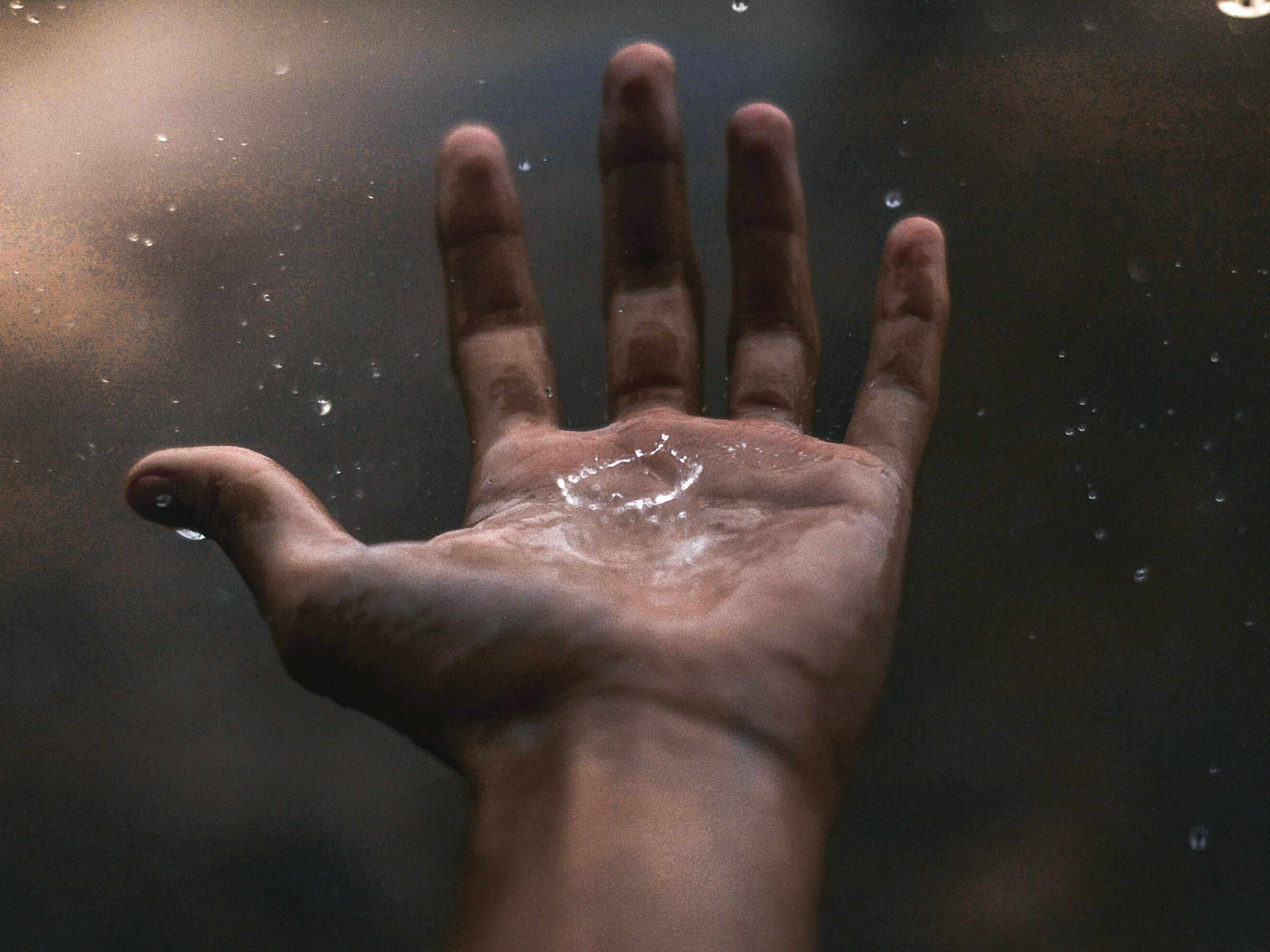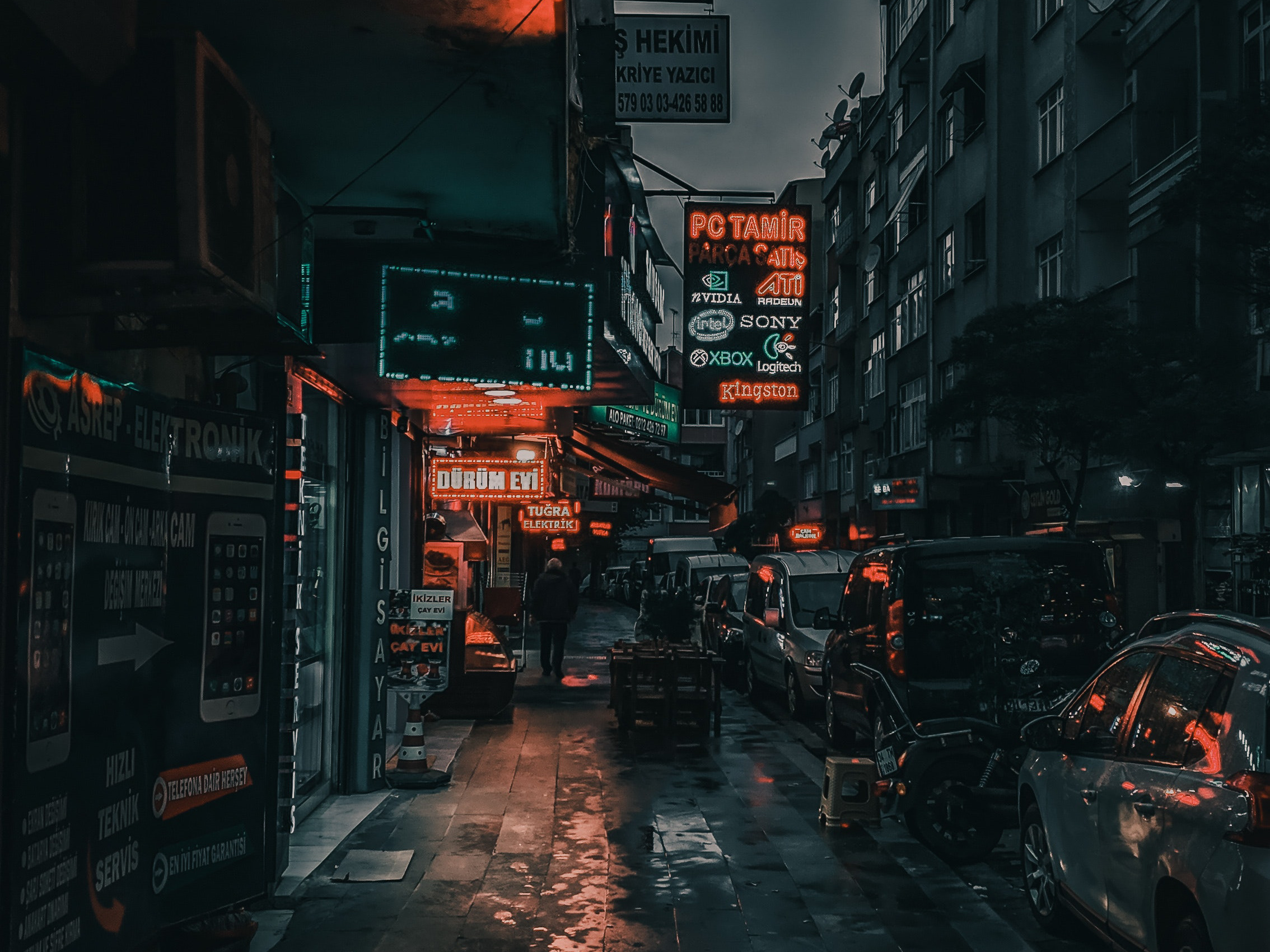The salty air pushes its way past the hull and brings a soft breeze over the main deck. The air is too thin, but it’s been that way for—what?—a decade or so now. Between fish steadily eating up all the CO2-consuming plankton, and the Amazon Desert too depleted for vegetation since 2048, thin air has been commonplace anywhere O2 factories aren’t pumping.
No factories in the ocean, as far as I can tell.
Dusty likes being at sea more than on land for that reason. Not that he doesn’t love his family—he loves them more than anything—but there’s just something about looking out in any direction and not seeing smog-ridden skylines and ever-churning factories. The sea holds an unrelenting white noise and a quiet resolve that will outlive them all. Or at least, outlive him, his daughter, and his granddaughter. He would have to learn to be okay with that.
A low wave crests at the stern, and a cool mist sprays Dusty’s weather-worn face. At sixty-and-change, he isn’t the young marine biologist he’d been in the early 2000’s. He’d spent his twenties on boats more than on land, and his fiancée barely managed to strip him of his sea-legs after their wedding. His house might have been in sunny Hawaii, and Koror after that, but his home is out here.
He shuts his bottle green eyes against the scorching sun. A bead of sweat starts at his temple and snakes its way to his chin. The steady bob and dip of the aged tug-boat grounds him to the task at hand: Bessie.
Dusty had his first encounter with Bessie when he was twenty-five. She was twenty, intimidating, and by far the most beautiful thing he’d ever laid eyes on. He was fresh out of university—a beginner’s eagerness coupled with youth's illusion of grandeur made him invincible. Or at least, he thought it did.
His research team was comprised of young, sun-burnt biologists, boating crew, and Captain Howards. He’d seemed like a miserable, ancient bastard at the time, but Dusty was quickly approaching Cap’s age. He wouldn’t be surprised if his own leathery, I’ve-seen-it-all-face was a mirror image of Cap’s.
They’d set sail off the coast of O’ahu with three spearguns, a bucket of GPS tags, and an unquenchable excitement for a world teaming just below the cerulean blue. Dusty, Carter, and Jean suited up in scuba-suits. Carter and Jean were regulars, but Dusty could barely check his gauges past trembling fingers. Cap thought someone more experienced should take on the task— and by Dusty’s own drumming heart, he couldn’t help agreeing— but by some stroke of fate, or the other guys not wanting to smell like chum for a week, Dusty was up to bat.
He lowered himself into the rusty diving cage, letting the water accept him into a domain so unlike his own. The water was crystal clear and tinted blue like stained glass. Phytoplankton drifted past like tufts of snow. Red crept into the water like rose petals, the coagulated blood and fish-heads a beacon for the creatures they’d come to find.
At first, a school of silver fish swarmed like termites on fresh wood, feeding and dodging away. Then, as if on cue, they disappeared into the dark blue below. Dusty’s heart hit like a bass drum, slamming into his ribs enough to hurt, but he breathed slow and steady. He’d been told many times over—despite popular belief—that the sound of our hearts scares them more than they scare us. But Dusty was scared. He couldn’t help it.
From the end of his sight, Dusty saw a small figure drifting forward, body swaying back and forth in a rhythmic dance. The current pulled his cage to and fro, rocking him like a rag-doll, but what approached him had strength that cut through steel.
It was her.
She approached, focus locked in on the chum. Her dorsal surface was mottled with patches of dark and light gray that contrasted sharply against the sleek white of her underbelly. She swam past Dusty with confidence that comes from power, and he couldn’t help but stare.
Dusty was a hair under six feet, but he could tell just by watching that she was at least three times his height. She snapped at the fish heads, drawing them in and circling the boat. She kept close, nearly hugging the hull, and Dusty’s entire vision was consumed by her. He reached gloved fingers through the bars. They ran down the side of her thick skin.
She felt it. She circled back. Her big, black eye was at his, mouth perched open to taste the water around him. He kept his heart as still as he could, not wanting to scare her. His heart wasn’t screaming with fear anymore; it screamed with excitement. With fascination. With awe.
She swept by close, her pectoral fin longer than his arm, and his fingers slid over it with wonder. He knew he had a job to do, but he could have stayed in that moment the rest of his lifetime. The rest of every lifetime. Raising his speargun, he aimed for her dorsal fin and pulled the trigger. The tag stuck on the first try, and as quickly as she’d entered his life, she left. Down and down into the darkness until her long, elegant tail camouflaged with the depths below.
When they pulled him from the cage, the crew barely had the gear off him before he was running to the monitors in his boxers. Lou was at the computer, grinning from ear to ear.
“You got it,” he said. “Now, you name it.”
Dusty had named her Bessie. He couldn’t be sure why, but it just felt right. He’d kept tabs on Bessie ever since, watching her geolocation circulate between the coast of O’ahu and the islands of Palau for nearly forty-five years. Sometimes, on research expeditions, he’d see her again.
Every time, she was a little different. A few more hooks stuck in the skin of her mouth and gills. More raw or scarring flesh where fishing line sliced into her before she could break away. Once, he’d seen her with her shoal and two pups keeping near. He’d tagged them too, but as time would tell and finning continued, Bessie outlived both of her young. Bessie outlived her entire shoal too, and the one after that.
In fact, Bessie outlived every other one of her kind. As each GPS tag surfaced the devastating truth, Bessie’s tag continued its migration through the Pacific. She is the last Great White shark, and likely the last shark left in any of the seven seas. By 2053, Bulls and Tigers were gone, and the Lemons and Sands weren’t far behind. As shy and elusive as Hammerheads were, finners had plowed through that population last year. Sure, there might be a goblin or whale shark somewhere in the depths, and a shark or two smart enough to keep away, but those were hopeful wishes. The facts are that of the 243,000 sharks tagged since 1962, only one tag still pings. It’d been pinging back and forth in the same lazy oval for forty-two years— until today. Today, Bessie traveled outside of Palau’s sanctuary space and crossed into dangerous waters.
Dusty walks across the deck to Carter. Despite the years, she still has that stubborn youth that makes her eyes gleam. She sits, hunched over a glare-ridden computer screen at the port of the boat, eyes glued to the green radar scanning over and over. Just like Lou used to.
“We’re ten klicks away,” she says without looking up.
He nods. Why Bessie would change her course after all these years, he doesn’t know. Perhaps she’d found another Great White. Maybe a new shoal with a new migration pattern.
“I told you I’d let you know when we’re within three.”
“In all the years you’ve known me, when have I managed to be patient?” Dusty cracks, and Carter rolls her eyes.
“Why don’t you go bug Jean in the wheelhouse? Or better, that new kid you brought along.”
Ah, yes, the new kid. At twenty-five, he’d never seen a shark outside aquariums. A good alternative to being hunted in the wild, but no substitute for the wide open.
The last of the aquarium sharks had died off a few years ago— gene pool too small, offspring too few and far between— but Dusty could never bring himself to go back there. He’d taken his granddaughter to see the sharks when she was three, and he couldn’t shake the guilt that ate away at him like starved piranhas. Innocent creatures imprisoned for a crime they’re not committing.
They were confined to a tank of stale water while the real killers had the entire ocean to themselves.
Dusty shuffles to the bow, decidedly not in the mood to talk to Jean or the new kid. His stomach writhes like live worms on hooks, waiting for him to bite at one before dragging their sharp tip through his gut. At the edge of his sight, something squats on the water. He squints, willing the low brimmed fog of ocean mist to clear. It looks almost like the outline of a small boat— about the size of their tug— and Dusty’s jaw tightens.
If it’s a boat, it doesn’t have a radio, otherwise Carter would have picked up on it. Dusty’s been around long enough to know a boat this far out and that far off the grid is seldom a good thing.
Longline fishers? Though the method had been outlawed in most places years ago, it didn’t stop truly determined fishers from poaching fish, endangered turtles, and sharks. The encroaching death of longline fishing was aided by the fact that science had gotten better— scarier by Dusty’s own opinion— allowing biotech companies to produce most meat products in labs instead of farming or fishing. One of the lucrative businesses to crop up was lab-generated shark fins; however, that hadn’t deterred shark finners. As far as the businessmen were concerned, pseudo-fins were a steady income, but the right man would pay handsomely for an authentic fin, especially as the natural supply dwindled into nonexistence. Dusty could only imagine how much the last authentic shark fin would go for— tens of thousands, if not more.
“Three klicks!” Carter shouts.
Dusty has witnessed enough shark finnings to last him an eternity. By his forties, he changed gears from marine biologist to marine conservationist. This boat was only one of a small fleet that used to travel the seas in search of shark finners. They’d do what they could to stop it, but between the legality of overtaking a ship and the plethora of fishers, victory was seldom tasted.
In his nightmares, he still sees the way finners cut the fins off living sharks— some less than a year old— before dumping their bleeding, breathing bodies back into the water. They never cared that whatever sharks didn’t bleed out on the descent would either drown or starve on the ocean floor, but Dusty could never stop caring. Never stop remembering.
The boat was coming into view now. Hull covered in barnacles, and wheelhouse open to the elements. A small crew scrambles around the deck, fishing lines haphazardly rolled around a rusted winch. A tarp squats near the bow, but he doesn’t see any fish. His teeth grind.
“New kid!” Dusty bellows. “Get the harpoon!”
“Harpoon?” Carter calls, and the sharp crack of her laptop snapping shut echoes to the bow.
New kid—God, what’s his name, James?—James hands Dusty the harpoon, and Dusty attaches the rope from the H-bitt to it. Carter runs to him, but he doesn’t look to her. He takes aim, just like he’s done a hundred times, and shoots.
The harpoon strikes the barnacle-ridden hull, rocking the small boat. The crew flail, struggling to keep balance. Then, realizing what’s happened, they race to cut the line.
“Pull it in.”
James obeys Dusty’s order, starting the capstan. As hard as the crew tries, they won’t be able to cut the rope in time.
“Dusty, what the hell?” Carter demands, but her voice is shaking. She knows what he’s thinking, and it chills her past the heat of the summer sun.
Dusty grabs the shotgun from its cradle on the starboard wall as the fishing boat bumps against the tire fender of the tug. Carter follows suit, her own gun in hand, and they hop onto the opposing boat.
The fishermen raise their hands over their heads, shouting in a different language to each other. One draws a handgun, but Carter is quicker. Her barrel is on him, and she pumps the shotgun.
“Drop it.”
Whether he understands her words or not, he knows enough to put his weapon on the deck.
Another crew member looks Dusty in the eye, pleading with him. His eyes dart to the tarp quickly, and he shifts his body as if to hide it from Dusty’s view. Dusty takes a step toward it, steeling his gut, and the man cries out again. He places his body between Dusty and the tarp.
“Move,” Dusty barks.
The man screams at him, but Dusty doesn’t understand. Using the butt of his shotgun, Dusty cracks him in the ribs, and the man falls to the ground with a pained gasp.
The tarp is low to the deck, wrinkled and misted with the ocean’s salty spray. Watery, pink liquid pools around its edges and leaks through a limber hole. Lowering his gun, Dusty tugs back the tarp.
A pile of mottled gray fins. Two pectoral fins a little longer than his arms. A long, elegant tail. One towering dorsal fin with a GPS tag through the top.
Dusty’s bottom lip quivers, eyes stinging as he takes a stiff step back. His teeth grind, and he runs a hand through his wiry, white hair. He looks away, pain in his eyes, but like the draw of a car wreck, his gaze is forced back. The blood at the jaggedly cut ends of the fins drip, drip, drips.
Dusty’s throat burns, hot coals starting there and plopping into his stomach. The fishing crew still yells to him, but their voices are nothing more than the white noise of the ocean.
He has no focus for them, only her.
She was the last Great White.
Photo Credit: Clem Onojeghuo





